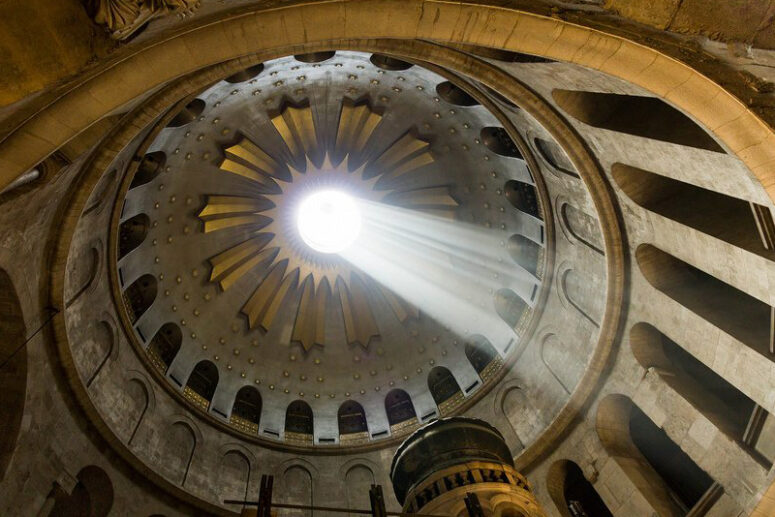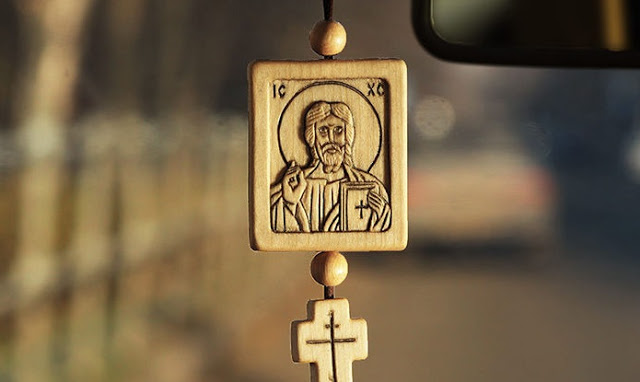
The feast of the Shavuot, or Jewish Pentecost, was approaching. On this day in the old times, God gave His chosen people the Law of Ten Commandments on Mount Sinai on the fiftieth day of the exodus of the Jews from Egypt (Exodus 19). On the eve of the celebration crowds of pilgrims from different corners of the Roman Empire had flocked to Jerusalem. Yet little did it occur to anyone, including the Apostles of Christ, that similar to the Old Testament Easter succeeded by the new Pascha, Christ had abolished the Great Shavuot, and a new feast was coming to replace it with the rising of the sun.
So when the morning came, the Apostles and the Theotokos gathered in the cenacle where Christ had recently celebrated the last Old Testament Easter and instituted the Sacrament of the Eucharist. It was perhaps their intention to meet the feast of the Shavuot at this place that they found familiar and dear to them. Yet, at the ninth hour of the morning, an unexpected thing happened. Suddenly a sound like the blowing of a violent wind came from heaven and filled the whole house where they were sitting. They saw what seemed to be tongues of fire that separated and came to rest on each of them. All of them were filled with the Holy Spirit and began to speak in other tongues as the Spirit enabled them.
On the day that Apostle Peter delivered his message to the people in Jerusalem, three thousand were baptised and formed the first community of Christians.
That way, the Pentecost became the birthday of our Church. How is it connected with the Descent of the Holy Spirit? The seven Holy Sacraments that Christ established are performed by the action of the Holy Spirit. The Apostles had received a new power, unparalleled to anything else in the world. They were given that power not to intimidate or rule over others, but to bring people to restore their distorted nature, overcome self-centredness and transform their spiritual and physical selves. Proof of the effectiveness and potency of the power of the Holy Spirit at the Church is the existence of many thousands of Christian saints.
The Church born on the fiftieth day after Christ’s resurrection reached across the boundaries that separated peoples and nations. The Apostles’ ability to speak in tongues symbolised the relevance of the Gospel for every person at all times and places, whatever their belief. The human walls of mistrust and hate were brought down. As Apostle Paul wrote, But now you must also rid yourselves of all such things as these: anger, rage, malice, slander, and filthy language from your lips. Do not lie to each other, since you have taken off your old self with its practices and have put on the new self, which is being renewed in knowledge in the image of its Creator. Here there is no Gentile or Jew, circumcised or uncircumcised, barbarian, Scythian, slave or free, but Christ is all, and is in all (Colossians 3: 8 – 11).
The radical lifting of the boundaries and divides among speakers of different languages, peoples and societal groups were unprecedented for that age. As the Apostles preached among the Pagans, the latter were struck by the straightforwardness of their message, which was highly unusual to them.
From the beginning, the disciples of Christ underlined the uniqueness of the truth that had opened up to them. They did not attempt to accommodate the pagan cults or to find a compromise with them. Instead, they rejected them outright, and would rather die as martyrs than accept the fallacies of others, or even pretend to do so.
How was it possible for the Apostles to bring to the peoples of the Roman empire the revolutionary teaching of Christ? How could such a small group of Christ’s disciples have avoided assimilation with the far more numerous adherents of various other beliefs? Why did the Roman emperors find it impossible to eradicate Christianity, despite their power and might? Apostle Luke gives us a solid answer: all these things were enabled by the descent of the Holy Spirit and its action.
Translated by The Catalogue of Good Deeds
Source: https://foma.ru/kto-pridumal-tserkov-kak-zhili-pervyie-hristiane.html





The Church of Christ, His Bride, was more precisely born on the Cross, coming forth from His side at His being pierced at the Crucifixion, as Eve was born of Adam’s side.
The Church of Christ on earth: CONCEIVED in the Incarnation, BORN on the Holy Cross, MANIFESTED on the Feast of Pentecost